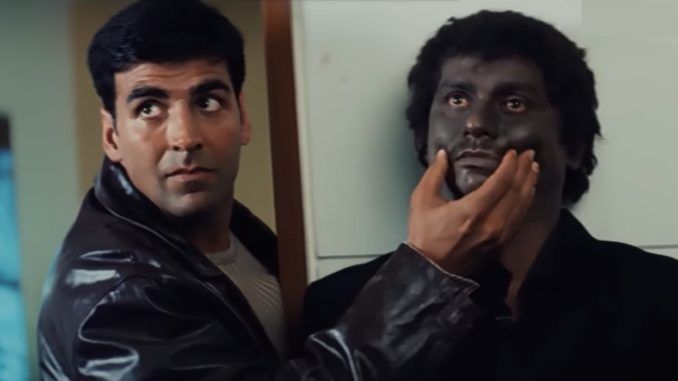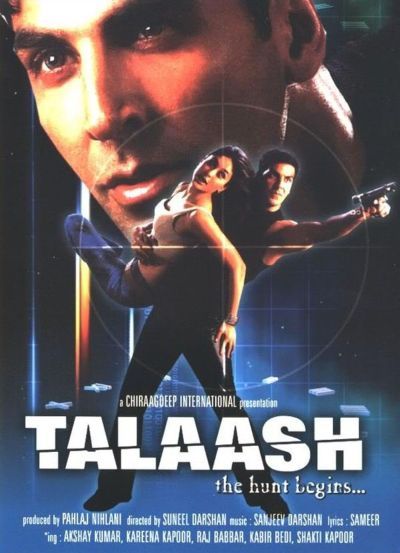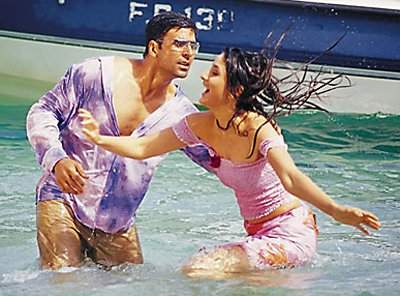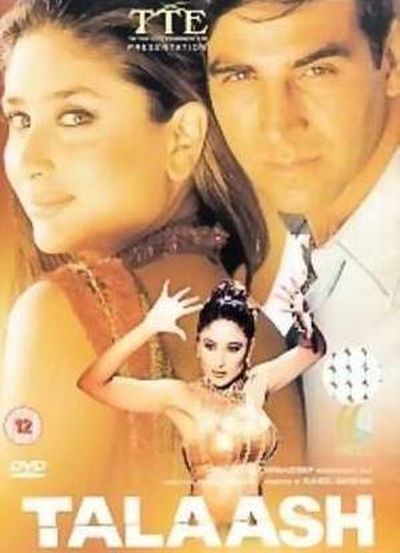
Rating: C-
Dir: Suneel Darshan
Star: Akshay Kumar, Kareena Kapoor, Pooja Batra, Raj Babbar
Bollywood films are all the rage now, with the Oscar-winning success of Slumdog Millionaire – even if was directed by the very un-Indian Danny Boyle. However, it is safe to say that not every product pumped out by the Mumbai studios over the years can quite claim to have been unjustly overlooked by the Academy, and Talaash is certainly one such case. Now, we are generally fond of the bright and breezy style favoured by film-makers on the Asian sub-continent. Three hours long? Not a problem. Enlivened by colourful dance numbers at regular intervals? Bring it on. Serve that sucker up with a keema naan and we are so there.
However, there are just some kind of films that do not suit this kind of treatment. Bollywood horror movies, for example, are a) pretty rare, and b) crap, for very good reason. When the participants are breaking out impeccably-choreographed moves, it’s almost impossible to sustain a mood of fear and abject terror. [Unless you’re watching Dancing With the Stars] Talaash is in exactly this category. It’s the kind of story which needs a completely different, non-musical approach. Chan-wook Park, director of Oldboy, would probably have been a great choice to take the story here in the proper direction. Which would be bleak, nihilistic, and everyone dies. Without bursting into song at any point, I should stress. To prove my point, here’s the synopsis.
 Babu works for three underworld dons, and when arrested, refuses to talk, in the knowledge they will take care of his wife and children. But when he finally gets home, he finds his family near-destitute. Enraged, he betrays his bosses: their revenge is to take his young daughter Pooja, and raise her to sell as a sex slave, with the chilling phrase, “She’ll be married every night, and widowed each morning.” When Babu tries to fight back, he is beheaded in front of his wife, and Pooja is abducted. His wife goes insane and spends years in a mental hospital. His son, Arjun, becomes a high-profile vigilante, and is now ready to find the killers, in their new identities, and face the many obstacles keeping him from rescuing Pooja and restoring his mother’s sanity.
Babu works for three underworld dons, and when arrested, refuses to talk, in the knowledge they will take care of his wife and children. But when he finally gets home, he finds his family near-destitute. Enraged, he betrays his bosses: their revenge is to take his young daughter Pooja, and raise her to sell as a sex slave, with the chilling phrase, “She’ll be married every night, and widowed each morning.” When Babu tries to fight back, he is beheaded in front of his wife, and Pooja is abducted. His wife goes insane and spends years in a mental hospital. His son, Arjun, becomes a high-profile vigilante, and is now ready to find the killers, in their new identities, and face the many obstacles keeping him from rescuing Pooja and restoring his mother’s sanity.
Now, don’t know about you, but I’m not exactly whistling a merry tune after reading that little story-line. However, the makers insist on treating it exactly as if it were the usual ‘boy meets girl’ fluffiness, so when Arjun finally discovers Pooja’s location, rather than – oh, I dunno, going there – he and Tina break into a musical number [below left] involving, for no readily apparent reason, a horse and a speedboat. Or, going the other way, another musical number is immediately followed by an attempted rape on Tina, still wearing the same costume in which she was happily bouncing around, not minutes before. The words “unevenness of tone’ don’t even begin to describe how all over the place this is. If you randomly spliced together I Spit on Your Grave with The Sound of Music, you’d be getting there.
Ah, yes. Tina. I completely forgot to mention her massively botoxed self. She is the daughter of one of the bosses involved in wrecking Arjun’s life, and for a long time we thought she was going to end up being Pooja. As a result, we spent the first two hours with our flesh crawling every time she and Arjun made doe-eyes at each other; it was like watching Princess Leia kissing whom everyone knows now is her brother, multiplied by a factor of about 1,000. At least they never sang about their love for each other. I’m not sure whether it’s a good thing or not that this potentially incestuous subplot doesn’t develop – though I guarantee you, it would have done in the Chan Wook-Park version.
 The hero is played by Akshay Kumar, who is one of our favourites and is well-suited to this role, since he can bring the appropriate level of angst to proceedings. However, once again, this carefully-constructed brooding intensity is completely derailed when Arjun starts busting out moves like he was Marky Mark and the Funky Bunch. Any hopes for sustained gritty realism are completely dashed the first time we see Arjun as an adult, where he leaps off the seat of a speeding motorcycle, flies through the windshield of an oncoming truck and then proceeds to beat up the arms-smuggling occupants. This does set the scene for the grand finale where he is shot twice in the chest, beaten up and still then manages to get up and fight the villain.
The hero is played by Akshay Kumar, who is one of our favourites and is well-suited to this role, since he can bring the appropriate level of angst to proceedings. However, once again, this carefully-constructed brooding intensity is completely derailed when Arjun starts busting out moves like he was Marky Mark and the Funky Bunch. Any hopes for sustained gritty realism are completely dashed the first time we see Arjun as an adult, where he leaps off the seat of a speeding motorcycle, flies through the windshield of an oncoming truck and then proceeds to beat up the arms-smuggling occupants. This does set the scene for the grand finale where he is shot twice in the chest, beaten up and still then manages to get up and fight the villain.
Credit Kumar for apparently doing a good deal of his own stunts, not least a sequence outside a train which is all the more impressive because you know there’s no blue-screen involved. That scene involves him having to race along the roof, and stop the train before it crashes into a school-bus stuck on a level crossing. This is because Tina – for a jape – has fed everyone on it save Arjun, including the driver, opium-laced candy balls. Oh, how the long winter evenings must just fly past. Fortunately, Indian trains have brakes that allow them to stop dead, inside about fifty feet, with a decorative shower of fireworks from their wheels. That’s part of a lengthy chunk set on the “palace on wheels”, which includes some of the most unfunny comic mugging I’ve ever seen. And I have sat through most of Wong Jing’s lesser works. Maybe it’s cultural, and Mumbai audiences were rolling in the aisles. If so, then this “we’re all the same really” is palpable nonsense.
 Arjun discovers he needs to go to South Africa, where he is helped by a former senior detective in the Mumbai force – now a South African taxi-driver, which must say something about the salary earned by an Indian cop. There he meets a ‘hostess’, and we were now convinced she was going to be his sister, forcing Arjun to commit suicide after committing incest. We really must stop watching Aki Kaurismaki films. In a thoroughly implausible twist, he convinces Tina her father is a villain, and she then makes her father see the error of his ways, and ‘fess up where Pooja is being held.
Arjun discovers he needs to go to South Africa, where he is helped by a former senior detective in the Mumbai force – now a South African taxi-driver, which must say something about the salary earned by an Indian cop. There he meets a ‘hostess’, and we were now convinced she was going to be his sister, forcing Arjun to commit suicide after committing incest. We really must stop watching Aki Kaurismaki films. In a thoroughly implausible twist, he convinces Tina her father is a villain, and she then makes her father see the error of his ways, and ‘fess up where Pooja is being held.
Arjun goes there to rescue his sister, only to be caught, beaten and forced to watch as Poona is auctioned off since he arrived the day of the sale. This is remarkably lucky, since an entire decade has passed since her kidnapping. I’m impressed with the bad guys’ restraint, feeding, clothing and keeping a young girl for so long, before selling her. Such charitable dedication can only be applauded. Their lair is simply fabulous, with the auction taking place somewhere that looks more like a Vegas show-lounge, though lacking the taste and restraint you’ll customarily find in the decor at such places. It also includes a fire-pit, inside which Arjun is chained and forced to watch proceedings.
Inevitably the sale takes the form of a fabulous dance number, which does much the same for sex trafficking as Pretty Woman did for street prostitution. The hero breaks free and snatches his sister; sudden cut to them on a motorcycle being chased through the South African streets. Quite why a 160-minute long movie couldn’t apparently be bothered to show any more than this, escapes me. The showdown between him and the lead villain [played by the same guy who was Gobindar in Octopussy] then follows, with entirely the expected resolution. Refreshing to find a director who refuses to counter the audience’s expectations in any way, it would appear.
The entire thing is available on Youtube: it really doesn’t do the epic, sweeping scale of the movie’s awfulness justice, You do however, get to see the most painful example of blackface (top) since The Black and White Minstrel Show went off the air. Enjoy.
